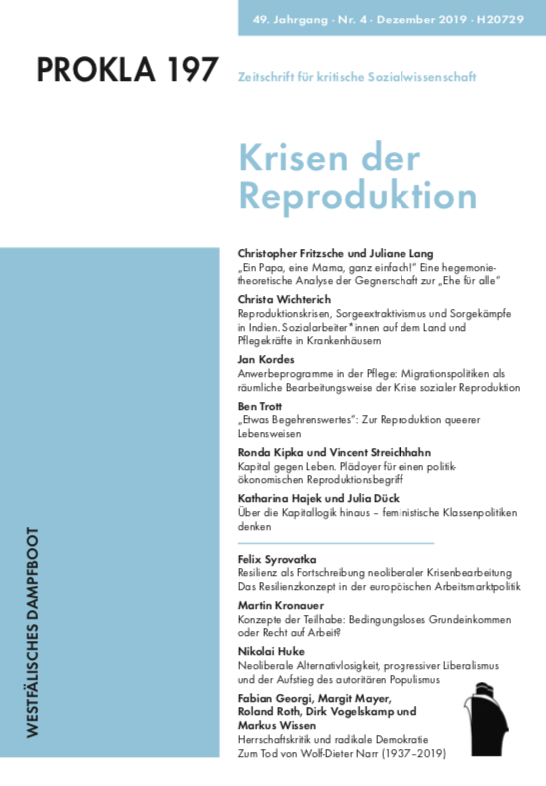„Etwas Begehrenswertes“
Zur Reproduktion queerer Lebensweisen
DOI:
https://doi.org/10.32387/prokla.v49i197.1846Schlagwörter:
Queere Lebensweise, Familie, Heteronormativität, HomonormatvitätAbstract
Der vorliegende Beitrag fragt, wie queere Lebensweisen heute entstehen und sich reproduzieren. Es wird argumentiert, dass viele, die ein queeres Leben in begehrenswerterweise leben wollen, schon lange einem der zentralen Orte der sozialen Reproduktion entkommen müssen, der Familie. Damit verbunden ist die Notwendigkeit, alternative Sorge- und Unterstützungsnetze aufzubauen, was oft nur durch (gegenkulturelle und andere) Räume außerhalb des häuslichen Bereichs ermöglicht wird. Weiter argumentiere ich, dass diese Tatsachen vielleicht überraschend oft in kulturellen (Mainstream-)Darstellungen von queerem Leben vorkommen, beispielsweise in Film und Fernsehen der letzten 30 Jahre. Überraschend deshalb, da dies im Widerspruch zu vielen anderen prominenten kulturellen Darstellungen steht, die verhandeln, wie sich LGBT-Menscheninzwischen innerhalb herrschender Institutionen etabliert haben, insbesondere Ehe und Familie, also – wie viele andere zurecht angemerkt haben – inmitten der Entstehung der völlig entpolitisierten „neuen Normalen“.
Downloads
Literaturhinweise
Albert Kennedy Trust (2015): LGBT Youth Homelessness: A UK National Scoping of Causes, Prevalence, Response, and Outcome. URL: http://www.akt.org.uk/Handlers/Download.ashx?IDMF=c0f29272-512a-45e8-9f9b-0b76e477baf1, Zugriff: 26.7.2019
Althusser, Louis (2001 [1970]): Ideology and Ideological State Apparatuses: Notes Towards an Investigation. In: Lenin and Philosophy and Other Essays. New York: 127-186.
Bärtsch, Tobias u.a. (Hg.) (2017): Ökologien der Sorge. Wien.
Bernard, Andreas (2015): Kinder machen: Neue Reproduktionstechnologien und die Ordnung der Familie. Frankfurt/M.
Bhattacharya, Tithi (Hg.) (2017): Social Reproduction Theory: Remapping Class, Recentering Oppression. London. DOI: https://doi.org/10.2307/j.ctt1vz494j
Brim, Matt und Ghaziani, Amin (Hg.) (2016): Queer Methods (Women’s Studies Quarterly). New York.
Bradlow, Josh u.a. (2017) School Report: The Experiences of Lesbian, Gay, Bi and Trans Young People in Britain’s Schools in 2017. URL: http://www.stonewall.org.uk/sites/default/files/the_school_report_2017.pdf, Zugriff: 26.7.2019.
Brown, Kath/Nash, Catherine J. (Hg.) (2010): Queer Methods and Methodologies: Intersecting Queer Theories and Social Science Research. London.
Campkin, Ben/Marshall, Laura (2017): LGBTQ+ Cultural Infrastructure in London: Night Venues, 2006 – Present. URL: http://www.ucl.ac.uk/urbanlab/docs/LGBTQ_cultural_infrastructure_in_London_nightlife_venues_2006_to_the_present.pdf, Zugriff: 26.7.2019.
Cooper, Melinda (2017): Family Values: Between Neoliberalism and the New Social Conservativism. New York.
Dalla Costa, Mariarosa/James, Selma (1975): Women and the Subversion of Community. In: The Power of Women and the Subversion of Community. Bristol: 21-56.
Dodge, David (2017): Are Mitch & Cam TV’s Most Boring Gay Couple (6.5.2017). URL: https://www.gayswithkids.com/mitch-cam-old-news-2465989953.html, Zugriff: 30.7.2019.
Duggan, Lisa (2003): The Twilight of Equality? Neoliberalism, Cultural Politics, and the Attack on Democracy. Boston.
Durso, Laura E./Gates, Gary J. (2012): Serving Our Youth: Findings from a National Survey of Service Providers Working with Lesbian, Gay, Bisexual and Transgender Youth Who are Homeless or At Risk of Becoming Homeless. URL: http://www.williamsinstitute.law.ucla.edu/wp-content/uploads/Durso-Gates-LGBT-Homeless-Youth-Survey-July-2012.pdf, Zugriff: 26.7.2019.
Eribon, Didier (2004): Insult and the Making of the Gay Self. Durham. DOI: https://doi.org/10.1215/9780822385493
European Union Agency for Fundamental Rights (2014): EU LGBT survey – European Union Lesbian, Gay, Bisexual and Transgender Survey: Main Results. URL: http://www.fra.europa.eu/sites/default/files/fra-eu-lgbt-survey-main-results_tk3113640enc_1.pdf, Zugriff: 26.7.2017.
Federici, Silvia (2012a): Aufstand aus der Küche. Reproduktionsarbeit im globalen Kapitalismus und die unvollendete feministische Revolution. Reihe Kitchen Politics – Queerfeministische Interventionen, Band 1. Münster.
– (2012b [1975]) Wages against Housework. In: Revolution at Point Zero: Housework, Reproduction, and Feminist Struggle. New York: 15-22.
Foucault, Michel (1985 [1981]): Von der Freundschaft als Lebensweise. Gespräch mit René de Ceccatty, Jean Danet und Jean le Bitoux. In: Von der Freundschaft als Lebensweise. Im Gespräch. Berlin: 85-93.
Garber, Megan (2016): What I Learned from Re-Watching My So-Called Life as an Adult (20.7.2016). URL: https://www.theatlantic.com/entertainment/archive/2016/07/what-i-learned-from-rewatching-my-so-called-life-as-an-adult/492005/, Zugriff: 30.7.2019.
Gould, Deborah B. (2009): Moving Politics: Emotions and ACT UP’s Fight Against AIDS. Chicago. DOI: https://doi.org/10.7208/chicago/9780226305318.001.0001
Greenhalgh, Hugo (2017): Grindr and Tinder: The Disruptive Influence of Apps on Gay Bars (12.12.2017). URL: https://www.ft.com/content/be9779b6-bfcb-11e7-823b-ed31693349d3, Zugriff: 30.7.2019.
Halberstam, Jack (1998): Female Masculinities. Durham.
– (2005): In a Queer Time & Place: Transgender Bodies, Subcultural Lives. New York.
– (2013): Gaga Feminism: Sex, Gender, and the End of Normal. Boston.
Halperin, David M. (2012): How To Be Gay. Cambridge. DOI: https://doi.org/10.4159/harvard.9780674067516
Hester, Helen (2018): Xenofeminism. Cambridge.
Jackson, Jonathan David (2002): The Social World of Voguing. In: Journal for the Anthropological Study of Human Movement 12(2): 26-42.
Kim, Richard (2016): Please Don’t Stop the Music (12.6.2016). URL: https://www.thenation.com/article/please-dont-stop-the-music/, Zugriff: 30.7.2019.
Kitchen Politics (Hg.) (2015): Sie nennen es Leben, wir nennen es Arbeit. Biotechnologie, Reproduktion und Familie im 21. Jahrhundert. Münster.
Laslett, Barbara/Brenner, Johanna (1989): Gender and Social Reproduction: Historical Perspectives. In: Annual Review of Sociology 15: 381-440. DOI: https://doi.org/10.1146/annurev.so.15.080189.002121
Laufenberg, Mike (2012): Communities of Care. Queere Politiken der Reproduction (12.2012). URL: http://www.zeitschrift-luxemburg.de/communities-of-care-queere-politiken-der-reproduktion, Zugriff 26.7.2019.
Love, Heather (2016): Queer Messes. In: WSQ: Women’s Studies Quarterly 44(3-4): 345-349. DOI: https://doi.org/10.1353/wsq.2016.0068
Malos, Ellen (Hg.) (1980): The Politics of Housework. London.
Moore, Madison (2018): Fabulous: The Rise of the Beautiful Eccentric. New Haven.
Nolan, Emma (2017): LGBTIQ Homelessness. In: Homeless in Europe (Herbst 2017). URL: http://www.feantsa.org/download/fea-008-17-magazine_v33480239002912617830.pdf, Zugriff: 26.7.2019.
Pew Research Center (2019): Same-Sex Marriage Around the World (17.05.2019). URL: https://www.pewforum.org/fact-sheet/gay-marriage-around-the-world/, Zugriff: 31.7.2019.
Preciado, Paul B. (2016): Politically Assisted Procreation and State Heterosexualism. In: South Atlantic Quarterly, 115(2): 405-410. DOI: https://doi.org/10.1215/00382876-3488502
Reddy, Chandan C. (1998): Home, Houses, Nonidentity: Paris Is Burning. In: George, Rosemary Marangoly (Hg.): Burning Down the House: Recycling Domesticity. Boulder: 355-379. DOI: https://doi.org/10.4324/9780429039775-16
Rosenberg, Alyssa (2012): ‘Modern family’ and Gay Marriage: It’s Complicated (13.10.2012). URL: https://www.theatlantic.com/entertainment/archive/2010/10/modern-family-and-gay-marriage-its-complicated/64397/, Zugriff: 30.7.2019.
Storey, John (2010): Cultural Studies and the Study of Popular Culture. Edinburgh.
Takács, Judit (2006): Social Exclusion of Young Lesbian, Gay, Bisexual and Transgender (LGBT) People in Europe. URL: http://www.ilga-europe.org/sites/default/files/Attachments/social_exclusion_of_young_lesbian_gay_bisexual_and_transgender_people_lgbt_in_europe_april_2006.pdf, Zugriff: 26.7.2019.
Trott, Ben (2016) Same-Sex Marriage and the Queer Politics of Dissensus. In: South Atlantic Quarterly 115(2): 411-423. DOI: https://doi.org/10.1215/00382876-3488513
Warner, Michael (1991) Introduction: Fear of a Queer Planet. In: Social Text 29: 3-17.
Winker, Gabriele (2015) Care Revolution. Schritte in eine solidarische Gesellschaft. Bielefeld. DOI: https://doi.org/10.14361/transcript.9783839430408





